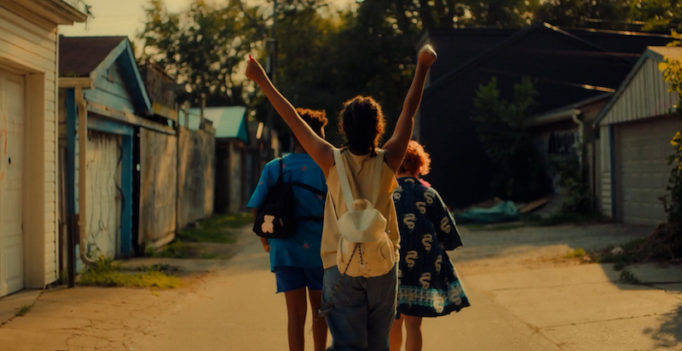By: Trevor Chartrand
Soft (which was featured in TIFF’s Discovery program last year) is a coming-of-age drama that, while captivating, can be difficult to watch – largely due to its meandering nature.
Soft wanders along, light on plot, and requires an extremely patient audience. Fifty percent of the movie’s runtime features rambunctious tweens running rampant on the streets of Toronto, struggling to discover who they are in a typical ‘coming-of-age’ fashion. This film specifically takes a close look at a trio of LGBTQ+ kids – each with their own concerns about how being queer might affect their future.
Otis (Harlow Joy) fears his religious father, and what coming out would mean for their relationship. Tony (Zion Matheson), is a tag-along, always one step behind the group, reluctant yet bold. At the center of the film, though, is Julien (Matteus Lunot). Rejected by his mother, he has found refuge living with a transwoman named Dawn (Miyoko Anderson), a well-intentioned sex worker who keeps a roof over their heads. Julien is brave but broken, an overlooked societal outcast desperately clinging to what little stability he has left.
While the young actors featured in the film give extraordinary performances, the characters they’re playing are obnoxious, obtuse and irritating. In other words, Soft depicts a very realistic picture of young adults! From the opening scene, where the three leads steal cigarettes and taste condoms, they’re annoyingly grounded – and stay that way for the rest of the film. They come across as arrogant and their loud personalities quickly become tiresome.
They’re kids who are forced into some very adult situations and handle it with this facade of maturity and toughness that doesn’t really fool anyone. That is, there’s an innocence to their aggressiveness, in which the characters are extremely well-executed, but they’re also extremely tedious. I’ll age myself with a timeless proclamation of, ‘kids these days, right?’
Soft finds its stride halfway through the film, fumbling its way into a mild plot: Julien’s caretaker Dawn stops coming home, apparently missing. Feeling guilty, confused, and alone, Julien and his friends team up to search for the missing Dawn – the consequences of not finding her, for Julien, would be a life on the streets.
The film features amateurish, shaky-cam cinematography that effectively lends a wild, vérité style to the picture. Many moments feel stolen and grimy, which brings us down to street-level with these kids, and matches their relentless energy.
Narratively Soft may be fairly stagnant, but it works more as a character study than anything else. These kids are looked down upon and ignored by wider society, and it’s not easy to watch them suffer hardship after hardship (I feel for them, I do), but it doesn’t make them any less bratty and annoying.
From Canadian writer/director Joseph Amenta (making his feature-length directorial debut), Soft does character and world-building masterfully well and it’s an effective, if bleak, little film. It’s a movie that tries my patience constantly, but I can hardly fault it for depicting children as they are in the wild. It’s an intriguing look at the marginalized outsiders in our world, and gives an important perspective that might otherwise go unfounded by most mainstream audiences.
**********
Do You Tweet? Follow These Tweeple:
Trevor Chartrand: @OhHaiTrebor





Be the first to comment